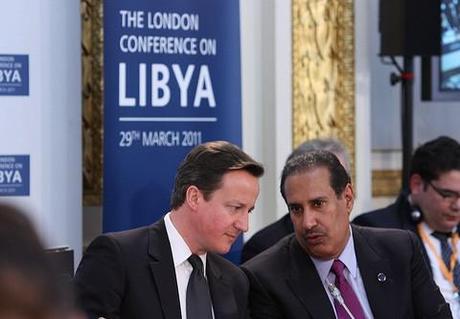
David Cameron at Libya talks in March. What does the future hold now? Photocredit Foreign and Commonwealth Office http://www.flickr.com/photos/foreignoffice/5571667738/sizes/m/in/photostream/
Is this the era of new colonialism? Is the conflict in Libya over yet? British Prime Minister David Cameron, and French President Nicolas Sarkozy visited the North African country on Thursday. Comparisons with Tony Blair after Kosovo and George W Bush after Iraq are being mooted; but the leaders are downplaying any sense of triumphalism, instead making it clear that the impetus came largely from the Libyan people. Now, as rebel forces are reported to be launching an attack on the loyalists and to have entered the stronghold of Sirte (Gaddafi’s birthplace), it seems that the gamble in Libya might have paid off.
France and Britain were the two countries that led the bombing campaign against Colonel Muammar Gaddafi’s forces, aiding the rebel forces in their fight. The former dictator is still at large, however, and his loyal fighters still skirmish in a few towns. In Benghazi, according to Richard Spencer in The Daily Telegraph, babies are being named “Sarkozy”, whilst crowds chanted “Thank you Cam-Ron.”
Cameron and Sarkozy were received in Tripoli and Benghazi, where, according to The Financial Times, they were given a hero’s welcome, with flag-waving and cheers. But there’s still much to do.
“This is the moment where we see the Arab Spring become the Arab Summer and we see democracy advance in other countries, as well. This is not finished, this is not done, this is not over. There are still parts of Libya under Gaddafi’s control,” said David Cameron, quoted in The Financial Times.
- Boo to Cameron! Con Coughlin in The Daily Telegraph says that the PM is “sorely mistaken” if he thinks things are over. Gaddaffi continues to cause a nuisance: the military campaign’s got a long way to go. Plus, the National Transitional Council isn’t actually all that friendly – though it owes Britain and Nato a huge debt, it’s been refusing to cooperate with Britain over the Yvonne Fletcher murder and the Lockerbie bomber; plus they’re also requiring apologies over the claim that MI6 had a part in illegal rendition. These are bad omens, and Cameron may regret this “foolhardy intervention.” A commenator on the article, clothcap, went even further, calling it “illegal, fraudulent, muderous” as well as “colonialist.”
- Cameron’s wrong? Andrew Pierce in The Daily Mail was likewise Eeyoreish, saying Cameron should have waited. Libya could still become a “quagmire like Iraq.” This visit was more about polishing up Cameron’s position as an “international statesman,” with the intention of turning him into a “warrior king.” But there won’t be a similar poll bounce for Cameron as there was for Margaret Thatcher after the Falklands. This intervention has cost hundreds of millions, and is hypocritical to boot. Cameron should be looking closer to home – what about the Euro crisis?
- No he’s not, but be careful. Quentin Letts, however, also in The Daily Mail, said that Cameron was “a giant among duckings,” his visit replete with “seigneurial striding”. Pats on the back all round: but whiilst “Cameron should not be begrudged a teaspoon of glory,” “let us not be entirely blind to the home front’s propaganda agenda.”
- Cameron ‘s right! The Daily Express’s leader said the Gaddafi is “gone for good”, and that the Libyans finally have freedom. Cameron deserves his applause. Libya was a big risk, but it’s paid off. Now Cameron needs to work on his reputation and build on what he’s achieved so far.
- Yay for Cameron! The Wintour and Watt blog on The Guardian was similarly upbeat. OK, the conflict might not be completely over – but looking at the scenes in Libya, it’s hard to argue with what Britain and France did. Both had to overcome resistance in high places to go ahead with the no-fly zone – and the politicians that stood in their way, including Baroness Ashton, EU foreign policy chief, and Robert Gates, then US defence secretary, are now eating their words. What’s happened is that two European powers have “worked together to change the course of history in North Africa.”

